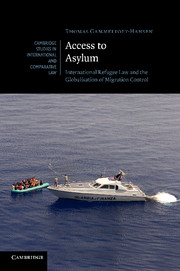Book contents
- Frontmatter
- Contents
- Foreword
- Preface
- Acknowledgements
- Table of treaties and other international instruments
- Table of cases
- 1 Introduction
- 2 The refugee and the globalisation of migration control
- 3 Refugee protection and the reach of the non-refoulement principle
- 4 Offshore migration control and the concept of extraterritorial jurisdiction
- 5 The privatisation of migration control and state responsibility
- 6 ‘Hic abundant leones’: the institutional reach of refugee protection
- 7 Conclusion
- Bibliography
- Index
- CAMBRIDGE STUDIES IN INTERNATIONAL AND COMPARATIVE LAW
5 - The privatisation of migration control and state responsibility
Published online by Cambridge University Press: 03 May 2011
- Frontmatter
- Contents
- Foreword
- Preface
- Acknowledgements
- Table of treaties and other international instruments
- Table of cases
- 1 Introduction
- 2 The refugee and the globalisation of migration control
- 3 Refugee protection and the reach of the non-refoulement principle
- 4 Offshore migration control and the concept of extraterritorial jurisdiction
- 5 The privatisation of migration control and state responsibility
- 6 ‘Hic abundant leones’: the institutional reach of refugee protection
- 7 Conclusion
- Bibliography
- Index
- CAMBRIDGE STUDIES IN INTERNATIONAL AND COMPARATIVE LAW
Summary
The ‘externalisation’ of migration control is not limited to states' own actions on the high seas or in foreign territory. In tandem with the horizontal shift in locations for migration control, a shift may also be traced in terms of the actors engaged. This includes, first, the increasing inter-state co-operation touched on in the previous chapter that has elevated migration management into a prominent foreign policy issue for the EU and many traditional asylum countries. Equally, however, migration and border control seem to have expanded vertically, enlisting private actors to perform crucial functions in regard to immigration control.
This chapter starts out by tracing the developments in private involvement for the purpose of migration control. As will be seen, private actors today occupy an increasing and varied role in migration management systems, and the effect of private migration control is increasingly felt by asylum-seekers and refugees.
Second, the chapter tries to elucidate when and under what circumstances states may be held responsible under international refugee and human rights law when migration control is delegated to private actors, such as airlines, border contractors or private security companies. Attempts to this end have so far been marred by difficulties in matching the traditional dictum that states are not responsible for the conduct of private actors with the current political reality and increased privatisation. International refugee law itself does not foresee that refugees are met by any other than a state's own officials.
- Type
- Chapter
- Information
- Access to AsylumInternational Refugee Law and the Globalisation of Migration Control, pp. 158 - 208Publisher: Cambridge University PressPrint publication year: 2011

